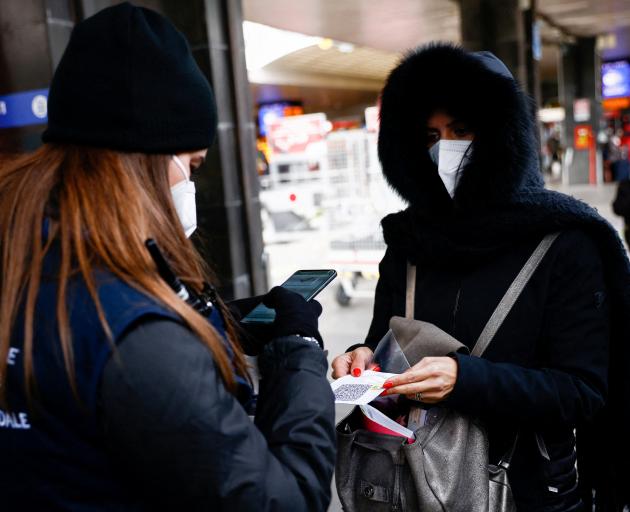The Omicron variant of Covid-19 is on track to infect more than half of Europeans, but it should not yet be seen as a flu-like endemic illness, the World Health Organisation (WHO) says.
The current population of Europe is 748,331,114 as of Tuesday, January 11, 2022, based on the latest United Nations estimates. Europe's population is equivalent to 9.78% of the total world population.
Europe saw more than 7 million newly-reported cases in the first week of this year, more than doubling over a two-week period, WHO's Europe director Hans Kluge told a news briefing on Tuesday.
"At this rate, the Institute for Health Metrics and Evaluation forecasts that more than 50% of the population in the region will be infected with Omicron in the next 6-8 weeks," Kluge said, referring to a research centre at the University of Washington.
Fifty out of 53 countries in Europe and central Asia have logged cases of the more infectious variant, Kluge said.
Evidence, however, is emerging that Omicron is affecting the upper respiratory tract more than the lungs, causing milder symptoms than previous variants. But the WHO has cautioned more studies are still needed to prove this.
The highly virulent strain is surging throughout Europe, with France on Tuesday reporting 368,149 new cases, the highest single-day tally of the pandemic since it began in early 2020.
The previous high of 332,252 was set on January 5, since when France - where highly contagious Omicron has become the dominant variant - has recorded two more days above 300,000.

Italy also recorded a record 220,532 new Covid cases, against 101,762 the day before, the health ministry said, while the daily tally of coronavirus-related deaths rose to 294 from 227.
Britain reported 120,821 new cases of Covid-19 on Tuesday, a drop on 142,224 on Monday, and another 379 deaths within 28 days of a positive test, up from 77, according to government data.
Poland's death toll from coronavirus-related conditions surpassed 100,000 on Tuesday, as vaccine hesitancy and a reluctance to abide by restrictions fuelled a surge in infections, officials and doctors said.
The number of deaths per one million inhabitants was last week among the highest in the world, according to the Our World in Data project at the University of Oxford, at more than 57 compared to around 35 in the United States and 37 in Russia.
Russia warned on Tuesday it could face a "very intense" rise in cases of the Omicron variant in coming weeks and authorities preparing for a new wave of infections said they would make more hospital beds available in Moscow.
On Monday, Spain's Prime Minister Pedro Sanchez said it may be time to change how it tracks Covid-19's evolution to instead use a method similar to flu, because its lethality has fallen.
That would imply treating the virus as an endemic illness, rather than a pandemic, without recording every case and without testing all people presenting symptoms.
But that is "a way off", WHO's senior emergency officer for Europe, Catherine Smallwood, said at Tuesday's briefing, adding that endemicity requires a stable and predictable transmission.
"We still have a huge amount of uncertainty and a virus that is evolving quite quickly, imposing new challenges. We are certainly not at the point where we are able to call it endemic," Smallwood said.
"It may become endemic in due course, but pinning that down to 2022 is a little bit difficult at this stage."
Meanwhile, a World Health Organization technical body said on Tuesday that current Covid vaccines may need to be reworked to ensure they are effective against Omicron and future variants of the coronavirus.
The technical group, made up of independent experts, said it would consider a change in vaccination composition and stressed that shots needed to be more effective in protecting against infection.
"The composition of current Covid-19 vaccines may need to be updated to ensure that COVID-19 vaccines continue to provide WHO-recommended levels of protection against infection and disease by VOCs (variants of concern), including Omicron and future variants," the technical body, tasked with making recommendations to the WHO, said in a statement.
"Covid-19 vaccines need to... elicit immune responses that are broad, strong, and long-lasting in order to reduce the need for successive booster doses," it added.
"A vaccination strategy based on repeated booster doses of the original vaccine composition is unlikely to be appropriate or sustainable."
However, the statement stopped short of advocating an Omicron-specific vaccine at this stage, saying more research was required and urging manufacturers to share data.
It said that an updated vaccine could be aimed specifically at the dominant variant, which is currently Omicron in many places, or be a "multivalent vaccine" designed to bust several variants at once. Further recommendations will be issued when more data is available, it added.
Some vaccine makers are already developing next-generation vaccines targeting Omicron, the highly contagious variant first detected in southern Africa and Hong Kong.
On Monday, Pfizer chief executive Albert Bourla said a redesigned Covid vaccine that specifically targets the Omicron variant would probably be needed and his company could have one ready to launch by March.
Rival Moderna Inc is also working on a vaccine candidate tailored to Omicron, but it is unlikely to be available in the next two months.
A WHO official had previously said the issue of vaccine composition required "global coordination" and should not be left to manufacturers to decide alone.













